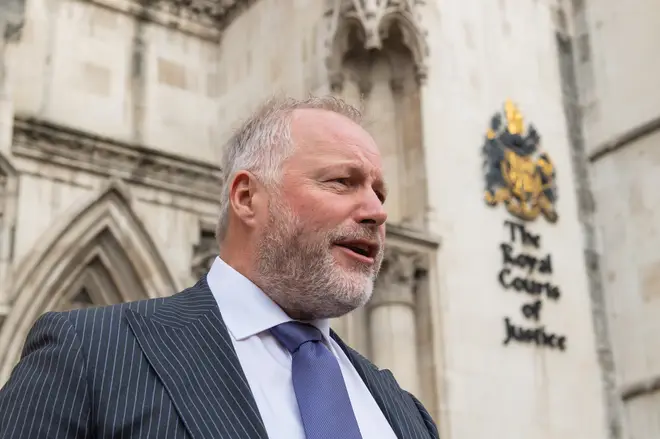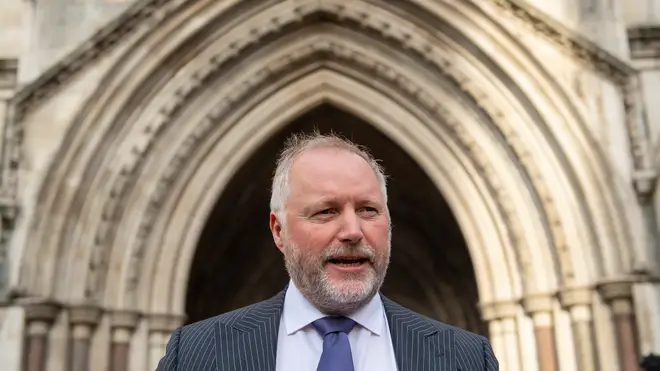
Daniel Barnett 9pm - 10pm
14 February 2020, 06:29 | Updated: 14 February 2020, 17:50

The High Court has ruled tweets which police treated as a 'hate crime' were lawful, and the force's actions were a "disproportionate interference" on his right to freedom of expression.
The High Court has handed down a judgement over a challenge brought by Harry Miller, 54, who argued College of Policing guidance has had "a real and substantial chilling effect" on freedom of expression.
Announcing the court's decision, Mr Justice Julian Knowles said: "The claimant's tweets were lawful and that there was not the slightest risk that he would commit a criminal offence by continuing to tweet.
"I find the combination of the police visiting the claimant's place of work, and their subsequent statements in relation to the possibility of prosecution were a disproportionate interference with the claimant's right to freedom of expression because of their potential chilling effect."
The judge added that the effect of the police turning up at Mr Miller's place of work "because of his political opinions must not be underestimated".
He continued: "To do so would be to undervalue a cardinal democratic freedom. In this country, we have never had a Cheka, a Gestapo or a Stasi. We have never lived in an Orwellian society."
In his judgment, Mr Justice Julian Knowles stated: "I conclude that the police left the claimant with the clear belief that he was being warned by them to desist from posting further tweets on transgender matters even if they did not directly warn him in terms.
"In other words, I conclude that the police's actions led him, reasonably, to believe that he was being warned not to exercise his right to freedom of expression about transgender issues on pain of potential criminal prosecution."
However, the court rejected Mr Miller's challenge to the College of Police guidance itself, the judge said he was "satisfied that the aims and objectives of (the guidance) justify the limitation it imposes on freedom of speech".
Mr Justice Knowles said the guidance pursued "extremely important" aims, including "preventing, or taking steps to counter, hate crime and hate incidents" and preventing "the escalation of hate-based hostility from low-level non-criminal activity to criminal activity".

"I have broad shoulders, but this fight is hard," Mr Miller told the Daily Mail newspaper. "If ordinary people like myself don't stand up against what I see as over-reaching authority by the police, who will?
"It is definitely not the job of the State to restrict what we can or cannot talk about, either in face-to-face conversation or online."
College of Policing guidance defines a hate incident as "any non-crime incident which is perceived, by the victim or any other person, to be motivated by a hostility or prejudice against a person who is transgender or perceived to be transgender".
The incident prompted Mr Miller to found the campaign group Fair Cop, which raises concerns about what it says are police attempts to criminalise people for expressing opinions that do not contravene any laws.
Mr Justice Julian Knowles is due to give a ruling on Mr Miller's legal action against the College of Policing and Humberside Police on Friday morning.
At a hearing in November, Mr Miller's barrister Ian Wise QC said his client was "deeply concerned" about proposed reforms to the law on gender recognition and had used Twitter to "engage in debate about transgender issues".
He argued that Humberside Police, following the College of Policing's guidance, had sought to "dissuade him (Mr Miller) from expressing himself on such issues in the future", which he said was "contrary to his fundamental right to freedom of expression".
Mr Wise told the court that Mr Miller used the Twitter account @HarryTheOwl - which has since been suspended - to tweet "extensively" about proposed reforms to the Gender Recognition Act for a number of years.
He added: "The claimant has never expressed hatred towards the transgender community, or sought to incite such hatred in others, and has simply questioned (at times provocatively and using humour) the belief that trans women are women and should be treated as such for all purposes."
Mr Wise submitted that Mr Miller's views "form part of a legitimate public debate and cannot sensibly be regarded as 'hate speech'", and that it would be "a classic case of a 'heckler's veto'" if it was permissible to interfere with his right to freedom of expression because his tweets "caused offence to some readers".
Jonathan Auburn, for the College of Policing, said Mr Miller has "engaged in regular tweeting relating to transgender people".
He referred to one tweet in which Mr Miller said: "I was assigned mammal at birth, but my orientation is fish. Don't mis-species me. F**kers."
Mr Auburn submitted: "While the claimant now expressly disavows having any personal hostility or prejudice towards transgender people, his social media messages speak for themselves."